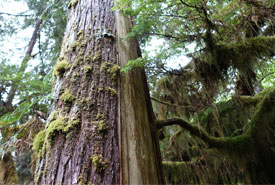Coastal forest

Culturally modified tree at Gullchucks (Photo by NCC)
British Columbia’s coastal rainforests are highly productive. This is largely due to a warm, wet maritime climate and steady source of marine-based nitrogen that is transferred to the land from fish, such as salmon, that swim upriver to spawn. The fish are then eaten by bears, and the fish carcasses are left on the forest floor. They eventually deteriorate and enrich the soil.
This is a place of exceptional biological richness. The landscape is an intricate mosaic of intact coastal temperate rainforest islands, inlets, valleys, marine waters, estuaries and freshwater systems. The coastal forest region is one of the last true wilderness regions of the planet where intact natural systems function at a large scale.
The coastal temperate rainforests found here are globally rare. They occur on less than one-fifth of one per cent of the Earth’s surface. These majestic forests are famous for trees of giant proportion. They contain more living biomass per acre than any other ecosystem in the world.
What trees are found in the coastal forest?
The coastal forest features a number of characteristic coniferous species:
- Douglas-fir
- Sitka spruce
- western redcedar
- western hemlock
What is NCC doing to help protect this forest?
In BC, the coastal forest region is a target for the Nature Conservancy of Canada's (NCC’s) conservation work. NCC has conserved forest in the Central Coast and Haida Gwaii, in addition to the Clayoquot Sound and Squamish Corridor areas.
NCC’s land management planning emphasizes working in partnership with First Nations (Haida, Heiltsuk, Wuikinuxv), scientific research institutions and education programs. Together, these partners work to ensure the most effective conservation of these forests and their natural values.




